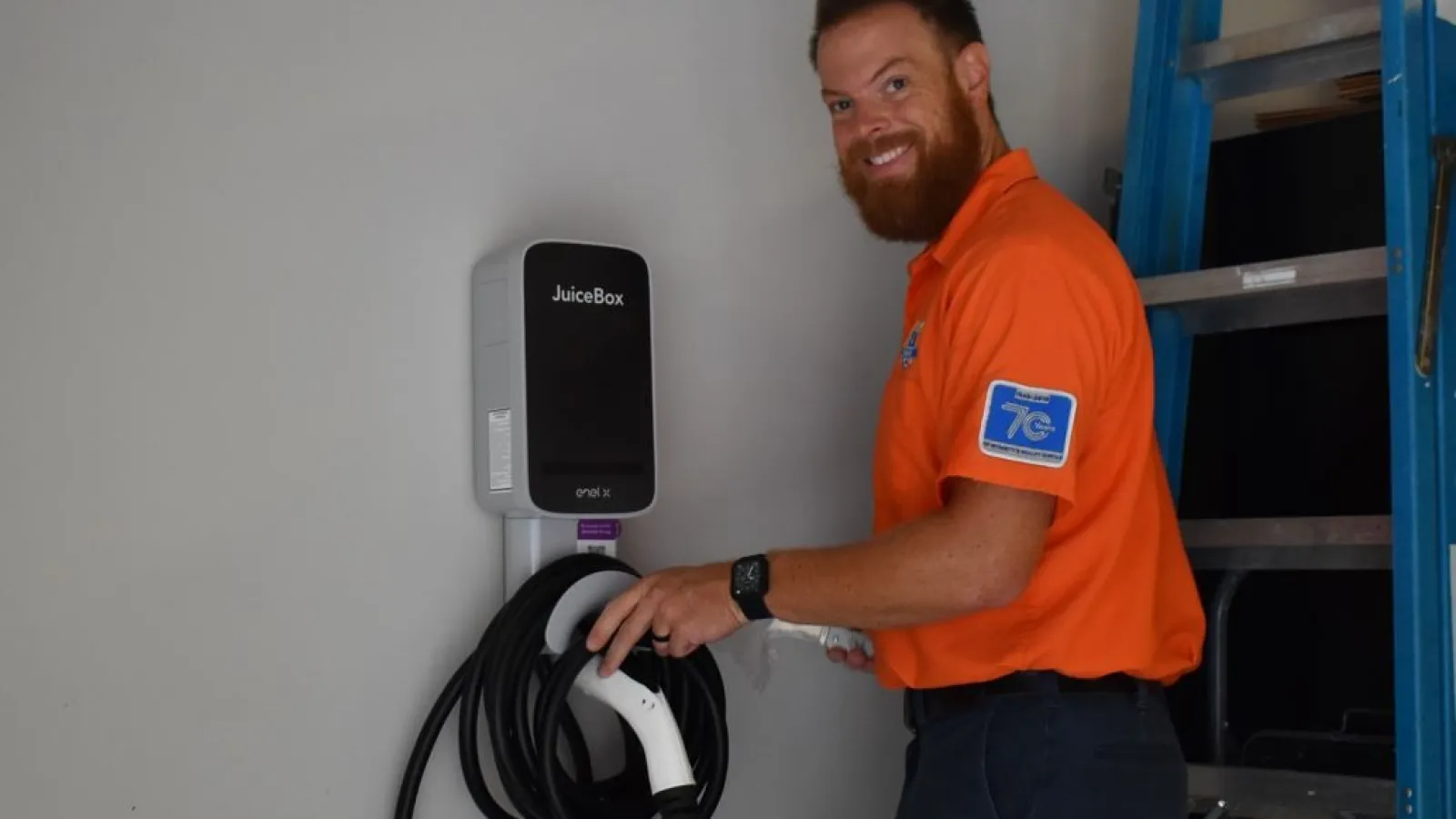Creating an inviting outdoor space adds to your home's livable square footage. Lighting is the key ingredient to taking your patio, balcony, or backyard from basic and boring to a cozy extension of your living space. The question is, how can you ensure that you're incorporating lighting safely into your outdoor space?
In this article, we'll explain what GFCI is, how it keeps you safe, what you need to know about electrical codes, and whether or not GFCI is required for different outdoor lighting scenarios.
What is GFCI?
GFCI stands for ground fault circuit interrupter. It is an electrical safety device designed to protect people from electrical shock and reduce the risk of electrical fires caused by ground faults. A ground fault occurs when electrical current escapes from the intended path, which can happen when there's a short circuit or when electrical current flows through an unintended conductor, such as water or a person's body.
GFCIs work by constantly monitoring the electrical current flowing through a circuit. If the GFCI detects any imbalance between the current going out on the hot wire and the current returning on the neutral wire, even by a very small amount, it means there may be a ground fault. In such a case, the GFCI quickly interrupts the flow of electricity by tripping or disconnecting the circuit, preventing harm to people and damage to property.
You'll notice that GFCIs are required in places where water or moisture may be present, like kitchens, bathrooms, garages, crawl spaces, and outside areas.
What You Need to Know About Electrical Codes
The National Electrical Code (NEC) sets the nationwide standard for safe electrical design, installation, and inspection so that you can keep yourself and your property safe from electrical hazards. Although there may be additional local codes, understanding the NEC's requirements for outdoor lighting is a great place to start.
The NEC directly addresses the requirements for outdoor circuits and lighting. According to the Spruce's 7 rules for outdoor receptacles (also known as outlets), the NEC requires the following:
GFCI protection is required for all outdoor receptacles. Some snow-melting and deicing equipment may be exempt from this rule.
Homes are required to have one outdoor receptacle at the front and one at the back of the house. They must be placed less than 6.5 feet above ground level.
If you have an attached deck or balcony with interior access, you must have a receptacle 6.5 feet or less above the ground of the deck or balcony.
If your receptacle is in a damp location (i.e., under a porch roof), it must be weather-resistant and have a weatherproof cover.
If your receptacle is in a wet (or exposed) location, it must be weather-resistant and have a weatherproof "in-use" cover.
If you have a swimming pool, the GFCI outlet must be no closer than 6 feet and no farther than 20 feet from the nearest edge of the pool. The outlet may not be more than 6.5 feet above the pool deck.
If your outlet powers a pump system for a pool or spa and is not GFCI-protected, it must be no closer than 10 feet to the inside walls of a permanent pool, spa, or hot tub. If your outlet is GFCI-protected, it must be no closer than 6 feet to the inside walls of a permanent pool, spa, or hot tub. These outlets cannot serve any other devices or appliances.
When a GFCI is required, you can choose either a GFCI receptacle or a GFCI circuit breaker. What's the difference? GFCI receptacles are installed at individual outlets and protect only devices plugged into that outlet. They are easy to retrofit and offer flexibility in choosing which outlets to protect. In contrast, GFCI circuit breakers are installed in the electrical panel and provide comprehensive protection for an entire circuit, safeguarding all connected outlets and devices. However, they do not alter the appearance of individual outlets and offer less flexibility in choosing specific locations for protection.
When Your Outside Lights Do and Don't Need GFCI
The answer is yes and (sometimes) no. According to section 210.8 of the National Electric Code, all outdoor receptacles must be protected by a GFCI. However, this doesn't apply to exterior light fixtures. Here is a general rule of thumb:
Yes, outdoor receptacles require GFCI
No, exterior light fixtures do not require GFCI protection
When You Need GFCI
Outdoor lights typically need GFCI protection in the following situations:
Outdoor Outlets: When outdoor lights are connected to electrical outlets in an exposed location, those outlets usually need GFCI protection. Examples include outdoor power outlets used for plugging in string lights, lawn equipment, or other devices.
Wet or Damp Locations: Outdoor lights in areas exposed to moisture, rain, or water, such as near pools, hot tubs, fountains, and outdoor kitchens, should be protected with GFCI protection to prevent electrical shock. For instance, lighting around a swimming pool should be GFCI-protected.
Outdoor GFCI Receptacles: In some cases, outdoor lights may not be hardwired but instead connected via GFCI receptacles. These GFCI receptacles protect the entire circuit, including the lights, when installed in locations that require GFCI protection.
GFCI Circuit Breaker: Outdoor lights can also be protected by a GFCI circuit breaker that is installed in the electrical panel. This provides GFCI protection to all the outlets and fixtures on that circuit. This is a common solution in older homes where GFCI outlets may not have been initially installed.
Extension Cords: If you're using extension cords for temporary outdoor lighting, it's advisable to use GFCI-protected extension cords. These are especially important when decorating for special occasions or events, like holiday lighting.
Wet or Damp Locations Near Ground Level: Outdoor lights installed in areas near ground level where water can accumulate, such as walkways or garden areas, should be protected with GFCI protection to reduce the risk of electrical shock.
When You Don't Need GFCI
Exterior light fixtures do not require GFCI protection in and of themselves because the primary purpose of GFCI protection is to prevent electrical shocks and fires caused by ground faults in electrical circuits. While exterior light fixtures are exposed to outdoor elements and weather conditions, the risk of a ground fault occurring within the fixture itself is generally low.
Outdoor light fixtures permanently wired into the wall typically do not require GFCI protection for the fixture itself. Light fixtures that are installed on the exterior of a building are often hardwired directly into the electrical system and are not the same as electrical outlets.
While the light fixture itself may not require GFCI protection, it's important to note that the wiring and junction boxes used for outdoor lighting must be installed in compliance with local electrical codes and regulations. This may include using weatherproof junction boxes, conduit, and appropriate outdoor-rated wiring to ensure the safety and durability of the installation. It's also important to ensure outdoor light fixtures are installed securely and designed for outdoor use, able to withstand environmental factors such as rain, wind, and UV exposure.
Schedule an Electrical Outlet Consultation Today with Estes Services
Ultimately, the need for GFCI protection for outdoor lighting depends on the specific electrical code and safety regulations in your area, as well as the type of outdoor lighting you have. In many regions, electrical codes require GFCI protection for outdoor electrical outlets and circuits, including those used for outdoor lighting.
Lighting can take your front or backyard to the next level, adding ambiance, warmth, and visibility. You can host outdoor dinner parties and linger even as the evening light fades. And when you prioritize electrical safety, you can enjoy peace of mind while you gather, rest, and play in your outdoor spaces.
Schedule an electrical outlet consultation with our licensed electricians today to ensure your home's comfort, health, and safety. It's that Easy; It's Estes!
FAQ
- Do I need separate circuits for my outdoor lights?
No, the National Electrical Code does not require you to install outdoor lights with individual GFCIs, although some professionals recommend it. If one light trips and all your outdoor lights are on a single circuit, the perimeter of your house will suddenly become very dark.
- Do string Christmas lights require GFCI?
Yes, you will need a GFCI outlet for your Christmas lights because the outlet is exposed to outdoor weather conditions.
- How high off the ground should an outdoor outlet be?
An outdoor outlet should be between 12 inches and 6.5 feet off the ground. If you live in an area with heavy snowfall, install your outdoor outlets above the expected snow level. Always make sure to check your local electrical codes and regulations, as they may specify specific height requirements for outdoor outlets based on regional factors and safety considerations.
- Does my outdoor outlet need a weatherproof cover?
Yes, all outdoor outlets must have weatherproof covers. These covers are designed to protect the outlet and receptacle from moisture, rain, and other environmental factors.

